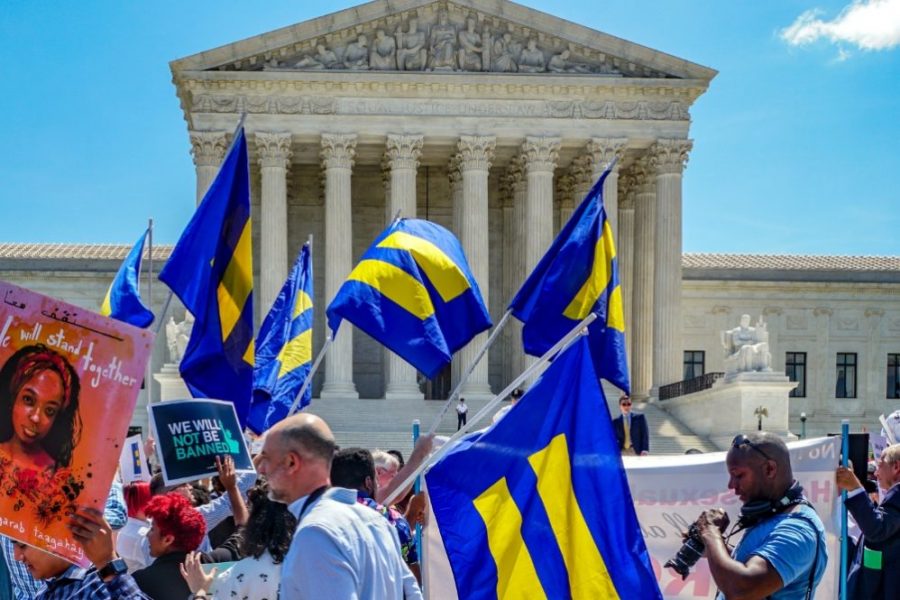The Gay Panic Defense Law Needs to be Abolished
Opinion
Ted Eytan
The Gay Panic Defense law is an extremely controversial law which justifies a person’s sexual orientation as motive for crimes committed against them. Many are calling for it to be repealed, considering how it lightens the sentence against murderers and discriminates against members of the LGBTQ+ community. Photo courtesy of Ted Eytan
September 21, 2020
Over the past years, America hasn’t exactly been best known for its famous testament of, “liberty and justice for all,” as seen by the multiple human’s rights activist groups fighting to repeal each tarnish towards a variety of minority groups. Breaking down stereotypes in society is one of the first crucial steps towards building a better community. However, doing that isn’t as easy as it seems, especially with unjust laws being set in place by the government. A prime example of one of these blatantly discriminatory legislations would have to be the Gay Panic Defense Law.
The Gay Panic Defense is a legal strategy that allows a person’s violence, usually murder, to be justified because of the victim’s sexual orientation. The apparent grounds for this law is that because of a psychological breakdown or panic attack, the attacker grows aggressive, causing them to attack the victim. Due to this loophole, dozens of murderers have gotten away with no more than a slap on the wrist for their actions, having the trial charged to a sentence even milder than manslaughter.
As of right now, there have been 108 recorded cases dating all the way back to the 1970s of this mechanism being used in an attempt to lighten a sentence. While this hasn’t necessarily been many cases considering the timeline, there’s still a catch. Since a majority of murder reports don’t include the victim’s sexual orientation, it’s near impossible to pinpoint the true amount of cases using this legislation. This factor implies that there are many more of these categorized murders than what the statistics entail.
In the U.S., there have only been nine states to ban the Gay Panic Defense Law, meaning there are still 41 that have yet to get rid of it. The nine states that have prohibited use of the mechanism have only done so in the past six years. What’s most troubling about this is that most of the states with the highest number of deaths under the law are the ones who have not banned it yet. Texas, being ranked the highest out of everyone else, is also included in the list of those yet to disallow the law. I’m not sure if Texas is waiting for a specific number before they actually do something, but considering the gathered information, Texas should have been one of the first states to take the initiative to outlaw this crude practice.
While we are on the topic of Texas, let’s go over one of the most controversial Gay Panic cases. On Sept. 27, 2015 in Austin, Texas, Daniel Spencer invited his neighbor James Miller over so they could have a discussion about their common interests, such as a shared love of music. Later that day, it would be reported that Miller had stabbed Spencer to death in his own abode. While in court, Miller tried to abuse the Gay Panic Defense Law by using it as a testament against Spencer. He claimed that Spencer tried to force himself on him, even though there was not a piece of evidence that would justify this event happening. What was even more strange was the fact that many people who had known Spencer testified that he had been heterosexual his entire life. Miller actually ended up succeeding in using the defense mechanism, making many people angry. His punishment resulted in 100 hours of community service and an $11,000 restitution to Spencer’s family. In the end, Miller didn’t have to serve any time in prison.
Although there have been multiple movements directed towards prohibiting the use of the Gay Panic defense law, the issue still remains. This situation just proves that the government still hasn’t progressed from when the law was created back in the ‘60s, when homophobic tendencies were even more predominant. This law is used against the entire LGBTQ+ community, and more predominantly towards trans and gay people. Even though our society is growing to become less prejudiced each day, growth is hard when you are working against the government instead of with them. As of right now, the most we as citizens can do to help stop this discrimination is support organizations that share a common goal of ending this prejudice, such as the LGBT Bar and the American Bar Association’s Commission on Sexual Orientation and Gender Identity.



